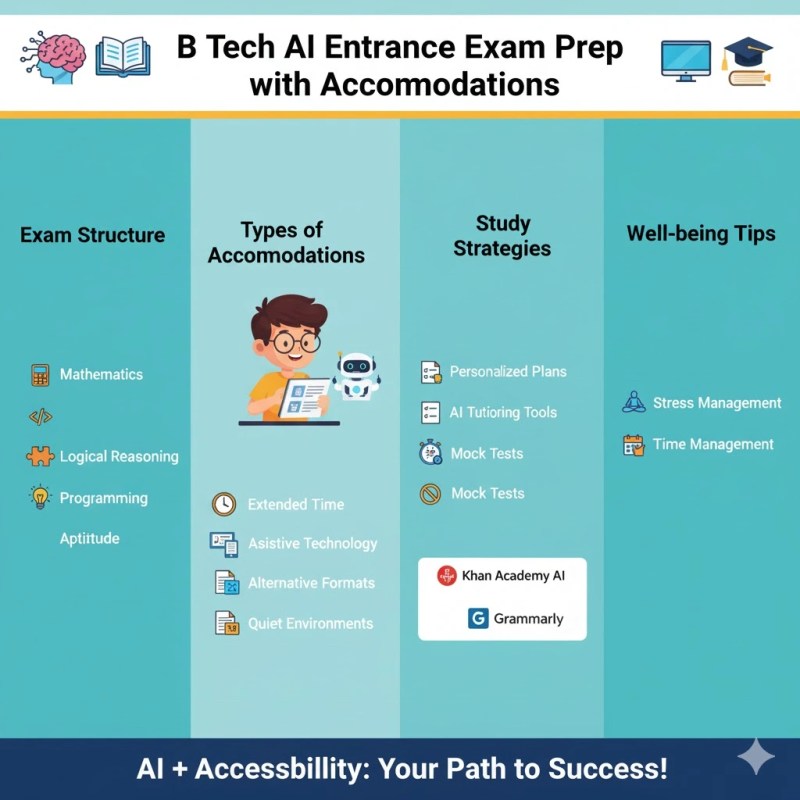Guide to Preparing for the B Tech in Artificial Intelligence Entrance Exams with Learning Accommodations 🎓
Pursuing a B Tech in Artificial Intelligence opens doors to a future in one of the most innovative fields today. Entrance exams for such programs can be challenging, particularly for students who require learning accommodations due to disabilities or learning differences. This guide provides actionable strategies, study resources, and tips for optimizing performance while considering personalized learning needs.
Understanding the B Tech in Artificial Intelligence Entrance Exam 🧠
The B Tech in Artificial Intelligence entrance exam evaluates students on several core areas:
- Mathematics: Topics like algebra, calculus, probability, and statistics.
- Logical Reasoning: Problem-solving, patterns, and analytical thinking.
- Programming Fundamentals: Basics of programming languages such as Python or C++.
- General Aptitude: Time management, quantitative reasoning, and verbal skills.
Students with learning accommodations should familiarize themselves with the exam format and identify areas that might require additional support or adaptive tools.

Types of Learning Accommodations Available 📚
Accommodations help level the playing field without altering the core evaluation criteria. Some common accommodations include:
- Extended Time: Extra time to complete sections.
- Assistive Technology: Screen readers, speech-to-text, and magnification tools.
- Alternative Question Formats: Large print, braille, or audio versions.
- Quiet or Separate Testing Environment: Reduces distractions for students with attention challenges.
- Scribes or Note-Takers: Assistance in writing or recording answers if needed.
According to the University Grants Commission, Indian universities encourage inclusive education policies to ensure accessibility for all students.
Effective Study Strategies for Students with Accommodations ✍️
1. Personalized Study Plans
- Break down the syllabus into manageable chunks.
- Schedule short, focused study sessions with regular breaks.
- Incorporate adaptive learning apps to tailor exercises based on strengths and weaknesses.
2. Utilizing Technology
- AI-based Tutoring Platforms: Tools like BYJU’S and Toppr use adaptive algorithms to provide personalized problem-solving exercises.
- Speech-to-Text Programs: Dictate answers or notes to improve writing efficiency.
- Mind Mapping Tools: Visualize concepts in AI, programming, and mathematics for better retention.
3. Focus on Core Subjects
| Subject | Recommended Approach | Resources |
|---|---|---|
| Mathematics | Practice with step-by-step guides and video explanations | Khan Academy, Brilliant.org |
| Logical Reasoning | Solve pattern and analytical reasoning questions daily | IndiaBix, Testbook |
| Programming | Write and debug simple programs to understand logic | GeeksforGeeks, HackerRank |
| General Aptitude | Time-bound practice and mock tests | CareerLauncher, Oliveboard |
4. Regular Mock Tests
- Simulate exam conditions using adaptive timing tools.
- Analyze results to identify weak areas.
- Adjust study plan accordingly.
Additional Support Resources 🌟
- Inclusive Study Groups: Join peer networks that understand accommodations.
- Professional Tutoring: Seek instructors familiar with AI curriculum and learning accommodations.
- Online Communities: Forums like Reddit’s r/ArtificialIntelligence provide guidance and mentorship.
- University Resources: Contact the admissions office to understand available support services for students with disabilities.
Balancing Well-being and Exam Preparation 🧘♂️
Mental Health and Stress Management
- Regular breaks and relaxation techniques, such as deep breathing or meditation.
- Encourage physical activity to maintain focus and reduce anxiety.
- Maintain a healthy sleep schedule.
Time Management Tips
- Use digital planners to schedule study sessions.
- Prioritize topics based on difficulty and weight in the exam.
- Allocate extra time for sections requiring accommodations.
Tracking Progress
- Maintain a daily log of completed topics.
- Use visual charts or graphs to monitor improvement.
- Regularly review and adjust learning strategies based on performance.
Conclusion 🎯
Preparing for a B Tech in Artificial Intelligence entrance exam can be manageable and effective when combining structured study strategies with the right learning accommodations. By leveraging technology, personalized study plans, and inclusive resources, students can maximize their potential and perform confidently in exams, paving the way for a successful career in AI.
FAQs
1. What is the B Tech in Artificial Intelligence entrance exam?
It is an entrance test evaluating core subjects like mathematics, programming, logical reasoning, and general aptitude to assess readiness for AI-focused engineering programs.
2. What learning accommodations are available for students?
Accommodations include extended time, assistive technology, alternative question formats, quiet testing environments, and scribes or note-takers.
3. Which subjects should I focus on for AI entrance exams?
Focus on mathematics, logical reasoning, programming fundamentals, and general aptitude to cover the core areas assessed.
4. How can technology help in exam preparation?
AI-based tutoring platforms, speech-to-text programs, mind mapping tools, and online mock tests can enhance learning efficiency and comprehension.
5. Are there resources specifically for students with disabilities?
Yes, inclusive study groups, professional tutors, online forums, and university support services provide guidance and accessible learning materials.




